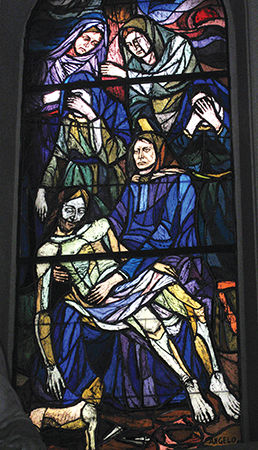In 2013, Pope Francis declared a Year of Consecrated Life, which began Nov. 30, 2014, and concludes on Feb. 2, 2016. This article is one of several that The Tidings will be featuring throughout the year to help readers better understand the great blessing of consecrated life.
The Passionist Religious Congregation was founded in Italy in 1741 by Paul Daneo, now known as St. Paul of the Cross (feast day, Oct. 20). The Passionists came to the United States in 1852, and to Sierra Madre, California, in 1924.
In 1932 we built a monastery, which lasted until the earthquake of 1991. Among our first responsibilities in the early years was the care of St. Rita’s parish in Sierra Madre.
The first Passionist men’s retreat was held under a tree on our property in 1926. Initially retreats were small; retreatants occupied rooms in the new monastery.
In 1950 a permanent retreat building was built. A later addition made space for a total of 106 retreatants. Our initial men’s weekend retreat program expanded to include women’s retreats and retreats for married couples.
People come from all over the Archdiocese of Los Angeles. Our retreat facility also hosts Kairos retreats, AA retreats and many other spiritual events.
In the past 90 years, our religious have conducted many parish missions throughout the Archdiocese of Los Angeles and assisted local parishes in their pastoral needs. On Good Friday, over three thousand people come to pray the Stations of the Cross in our beautiful garden.
When I first thought about becoming a priest and began looking around at various religious orders, the Passionists stood out. They offered a balanced life of action and contemplation, ministry and prayerful community life.
I went on to learn that the charism of the Passionist congregation flows out of a prayerful remembering of the suffering and death of Christ. This charism is expressed by compassion, forgiveness, hospitality, prayer and sacrifice.
rnCompassion. On the cross, Jesus knew he would be leaving his mother. He felt great compassion for her and entrusted her to the care of the apostle John.
“Mother, behold your son” (John 19:26). In community life, compassion is shown in cheering on those who need encouragement, reassuring those who are anxious, and sharing hopes and dreams with one another.
In ministry, compassion is shown in counseling those who are searching, comforting those who are suffering, consoling those who are bereaved, and listening to those who are sad.
Forgiveness. On the cross, Jesus forgave his persecutors. “Father, forgive them. They know not what they do” (Luke 23:34). In community life, forgiveness shows itself in being patient with the human limitations of one other, and being quick to apologize and forgive.
In ministry, forgiveness means helping people experience God’s pardon in the Sacrament of Reconciliation, encouraging people to be reconciled with each other, helping them heal hurts, bury regrets, let go of prejudice and find peace.
Hospitality. At the Last Supper Jesus fed his Apostles with his teaching of a new commandment, and he nourished them with the Holy Eucharist. In community life, hospitality includes sharing tasks, listening attentively to one another, caring for the elderly and feeding each other’s hunger for knowledge and pastoral skills.
In ministry, hospitality means welcoming people to the table of the Lord, feeding them with the word of truth and nourishing them with the bread of life. Hospitality also includes affirming people’s goodness, building up their self-esteem, feeding their hunger for meaning and quenching their thirst for affirmation.
Mostly, hospitality means welcoming everyone into our hearts.
Prayer. The Passion of Christ began with Jesus’ intense conversation with his Father in the Garden of Olives. In community life, prayer includes regular participation in the Holy Eucharist, the Liturgy of the Hours, meditation, contemplation and devotions.
In ministry, prayer includes leading the faithful in their participation at Mass, celebrating the sacraments, teaching meditation and contemplation, leading devotions, etc.
Sacrifice. On the cross Jesus sacrificed himself for us. “Into your hands, Father, I commend my spirit” (Luke 23:46). In community life, sacrifice is expressed in living the vows of poverty, chastity and obedience.
In ministry, sacrifice shows itself in the daily service of others.
At the Last Supper, Jesus gave the apostles bread and said, “This is my body given up for you.” He gave them a cup of wine and said, “This is my blood poured out for you.”
Then Jesus said, “Do this in memory of me” (Matthew 26:28; 1 Corinthians 11, 24-35). Do what “in memory of me?” Give up your bodies and pour out your blood for others.
In a word, sacrifice. Work for justice and peace. Lift up the poor. Stand up for life. Give it all you’ve got and don’t count the cost.
Passionists take a fourth vow, to “spread devotion to the Passion of Christ.”
We do this by our preaching and our life of prayer. And, to the best of our ability, we do it by our love of everyone, in imitation of the all-embracing love of Christ on the cross.

